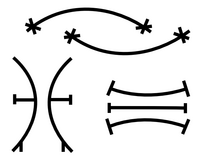Ibibio ethnic group

|
|
| Total population | |
|---|---|
| Over 5 million | |
| Regions with significant populations | |
|
|
|
|
|
46,000 |
|
|
39,000 |
|
|
2,700 |
|
(Afro-Trinidadian and Tobagonian) |
371 (1813) |
| Languages | |
| Ibibio, English | |
| Religion | |
| Christianity, traditional, | |
| Related ethnic groups | |
| Efik, Anaang, Ejagham, Oron, Igbo, Ijaw | |
The Ibibio people are from southeast Nigeria. They are related to the Anaang and Efik peoples. During colonial period in Nigeria, the Ibibio Union asked for recognition by the British as a sovereign nation (Noah, 1988). The Annang, Efik, Ekid, Oron and Ibeno share personal names, culture, and traditions with the Ibibio, and speak closely related varieties of Ibibio-Efik which are more or less mutually intelligible.
The Ibibio people are reputed to be the earliest inhabitants of the south eastern Nigeria. It is estimated that they arrived at their present abode from very earliest times, about 7000 B.C. In spite of the historical account, it is not clear when the people known as Ibibio arrived the state. According to some scholars, they might have come from the central Benue valley, particularly, the Jukun influence in the old Calabar at some historical time period. Another pointer is the wide-spread use of the manila, a popular currency used by the Jukuns. Coupled with this is the Jukun southern drive to the coast which appears to have been recently compared with the formation of Akwa Ibom settlements in their present location. Another version had it that the Cameroon will offer a more concise explanation of the Ibibio migration story.
This was corroborated by oral testimonies by field workers who say that the core Ibibio people were of the Afaha lineage whose original home was Usak Edet in the Cameroon. This was premised on the fact that among the Ibibio people, Usak Edet is popularly known as Edit Afaha (Afaha’s Creek) which reflects the fact that Ibibio people originated from Usak Edet. After the first bulk of the people arrived in what later became Nigeria, they settled first at Ibom then in Arochukwu. The Ibibio must have lived in Ibom for quite sometime, but as a result of clashes with the Igbo people culminating into the famous ‘Ibibio War’ which took place about 1300 and 1400A.D, they left Ibom and moved to the present day Ibibio land.
The Ibibio people are found predominantly in Akwa Ibom state and is made up of the related Anaang community, the Ibibio community and the Eket and Oron communities, although other groups usually understand the Ibibio language. Because of the larger population of the Ibibio people, they hold political control over Akwa-Ibom State, but government is shared with the Anaangs, Eket and Oron. The political system follows the traditional method of consensus. Even though elections are held, practically, the political leaders are pre-discussed in a manner that is benefiting to all.
...
Wikipedia
